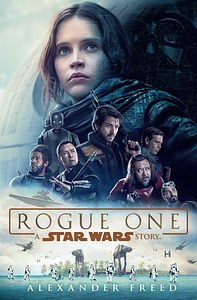Take a photo of a barcode or cover
The movie is definitely the superior experience. I would recommend the book for those who want more background and thoughts of the characters in the movie and those who loved the Catalyst prelude novel. You get a little more of Mon Mothma, General Dravis, and Admiral Raddus in the novelization, who are all great Rebel characters.
Awesome back story to Star Wars: A New Hope. I did worry that I would struggle with not knowing the characters, as I have not read many of the Star Wars books. That was silly! I quickly found myself wrapped in the plot and thrilled when recognizing familiar characters from Star Wars. Good book! Now I'm looking forward to finally watching the movie.
adventurous
emotional
tense
medium-paced
Strong character development:
Yes
Loveable characters:
Yes
Diverse cast of characters:
Yes
Flaws of characters a main focus:
Yes
3.5 ⭐ It didn't have the same emotional impact that came with the visuals and full musical score of the movie, but the back stories and inner dialogues, along with the sound effects and music on the audiobook, make the Rogue One novel a welcome addition to movie.
This is such a well-written book which is a rarity in a film to book adaptation. While there isn't any mind blowing new information in the text, we get a closer insight of the main characters (we also get some background on Mon Mothma which is cool). I don't think that *every* single scene had to be translated onto paper (some stuff with Draven could have been left out), but over all, this book is a great way to satiate a Star Wars craving until the film comes out onto DVD.
(4.4 of 5)
For a novelization of a screenplay, this is truly well done — it reads like a novel. Yet at the same time, it moves beat-for-beat, line-by-line with the film (which I watched again just after reading this). It helps that I already considered Rogue One to be the best of the Star Wars movies, for a variety of reasons mentioned in the longer review on my website.
adventurous
tense
fast-paced
Strong character development:
Yes
Loveable characters:
Yes
Diverse cast of characters:
Yes
Flaws of characters a main focus:
Yes
Wanna hear something shocking? I haven't seen Rogue One. Me, the chick who's read nearly every Star Wars book to date, who saw Revenge of the Sith in theaters three times (and cried through each one, mourning the End of Star Wars Movies), who has dressed as Darth Vader and/or Padme Amidala for numerous Halloweens and costume parties, has not seen the most recent Star Wars movie and has no plans to do so. The new canon books started weaning me off Star Wars and The Force Awakens made me go cold turkey. I lapsed a bit last fall and read the first two Thrawn books from the old canon, and I've considered reading the entirety of the old canon again from start to finish, but I just couldn't muster any interest in the new stuff.
But audiobook pickings are slim and typically Star Wars audiobooks are fun, at least, so I checked this one out. My feelings: a resounding "meh."
Freed tries to make you care about these characters. You have to care about them, right? Because we know they get the plans in the end, we need to have something to care about, and they wanted it to be the fate of these characters. But as with so, so many movie-to-book translations, generating internal thoughts and feelings that genuinely motivate the characters' on-screen actions fails in one of two ways. The internal lives of the characters are incoherent, largely because the on-screen action is driven by plot necessity and consistency of character is sacrificed. Or they are wildly grandiose and mercurial, because all the emotion that is typically expressed on screen by slight movements and glances must (for some reason) be explicitly stated, several times, and without any ambiguity or nuance.
Some illustrative, but not literal, examples: "He winced" is my least favorite set of words in this book because it's rarely used in any context where someone would actually wince, and it's never given any space to breathe or left on its own. 'He winced and tried to explain his actions' (nb: not an actual quote) just doesn't work. You don't do those things in the same breath. Or 'Jyn gave a genuine smile. It was the first time Cassian had ever seen her smile for real, and it was so honest and real it made him happy' (again, not a real quote). Also not necessary. There was (again, as typical of movie novelizations) way too much telling instead of showing.
I do appreciate the attempt to show that Jyn really does suffer due to her traumatic upbringing. I think it's a failed attempt (because the book, more than Jyn, seems to fixate on that cave imagery), and a melodramatic attempt, but I like that they tried.
And can we talk about the weirdly homogeneous cast of this story? I know Star Wars Brand is trying so desperately hard to get any points in the representation department - look, they cast pretty fair-skinned brunette white girls as leads for two new movies! - and this one does better than most. I love that Cassian gets to keep his actor's Mexican accent. I love that most of the rest of the main cast are people of color. So good on that front, Star Wars Brand! But it's weird, right, that outside of Mon Mothma, Jyn, and Jyn's mom, there are literally no other women in the story? Right? And that there are like, no non-human characters in this science fiction story set in a universe where there are lots of non-humans? And that Chirrut and Baze are definitely romantic partners but the story never explicitly says it?
Anyway, this didn't make me want to see the movie at all. The ending was a surprise but it didn't pack an emotional impact like it was trying to do.
But audiobook pickings are slim and typically Star Wars audiobooks are fun, at least, so I checked this one out. My feelings: a resounding "meh."
Freed tries to make you care about these characters. You have to care about them, right? Because we know they get the plans in the end, we need to have something to care about, and they wanted it to be the fate of these characters. But as with so, so many movie-to-book translations, generating internal thoughts and feelings that genuinely motivate the characters' on-screen actions fails in one of two ways. The internal lives of the characters are incoherent, largely because the on-screen action is driven by plot necessity and consistency of character is sacrificed. Or they are wildly grandiose and mercurial, because all the emotion that is typically expressed on screen by slight movements and glances must (for some reason) be explicitly stated, several times, and without any ambiguity or nuance.
Some illustrative, but not literal, examples: "He winced" is my least favorite set of words in this book because it's rarely used in any context where someone would actually wince, and it's never given any space to breathe or left on its own. 'He winced and tried to explain his actions' (nb: not an actual quote) just doesn't work. You don't do those things in the same breath. Or 'Jyn gave a genuine smile. It was the first time Cassian had ever seen her smile for real, and it was so honest and real it made him happy' (again, not a real quote). Also not necessary. There was (again, as typical of movie novelizations) way too much telling instead of showing.
I do appreciate the attempt to show that Jyn really does suffer due to her traumatic upbringing. I think it's a failed attempt (because the book, more than Jyn, seems to fixate on that cave imagery), and a melodramatic attempt, but I like that they tried.
And can we talk about the weirdly homogeneous cast of this story? I know Star Wars Brand is trying so desperately hard to get any points in the representation department - look, they cast pretty fair-skinned brunette white girls as leads for two new movies! - and this one does better than most. I love that Cassian gets to keep his actor's Mexican accent. I love that most of the rest of the main cast are people of color. So good on that front, Star Wars Brand! But it's weird, right, that outside of Mon Mothma, Jyn, and Jyn's mom, there are literally no other women in the story? Right? And that there are like, no non-human characters in this science fiction story set in a universe where there are lots of non-humans? And that Chirrut and Baze are definitely romantic partners but the story never explicitly says it?
Anyway, this didn't make me want to see the movie at all. The ending was a surprise but it didn't pack an emotional impact like it was trying to do.
There is not much to say about this since it's a novelization of the movie. I liked it. I liked all the little additional scenes and info and especially the thoughts of the characters I love. I wish, there would have been more about Bodhi, but, yeah, it's been one of the good novelizations. :)





